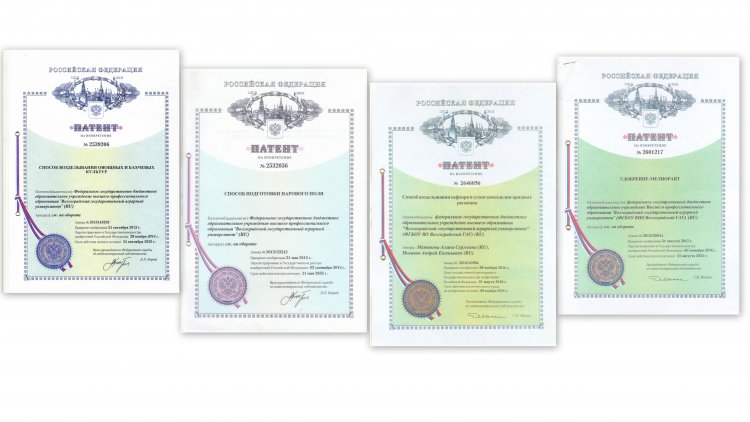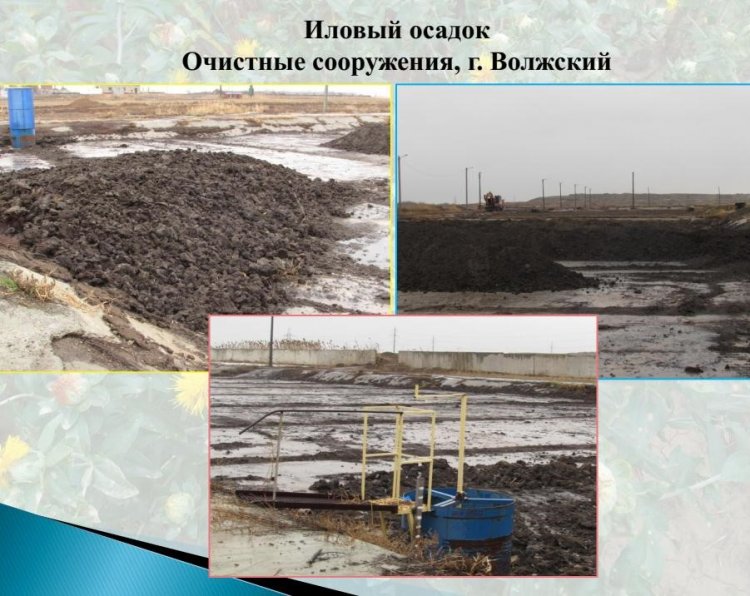Scientists from Volgograd-based Federal Agroecology Research Center (FARC) of RAS study promising untraditional ameliorant fertilizers based on anthropogenic (sewage sludge) and natural (for instance, glauconite) components which allow for restoring arable lands, which, in its turn, will help solve the problem of environmental protection and make a positive impact on fertility of soils in drought-ridden regions.
Stress climatic conditions and subsequent changes in ecosystems, as well as intensification of agriculture, irrigation and introduction of mineral fertilizers in large doses lead to degradation of lands and changes in resistance of grown crops to pests, which results in productivity losses and inferior harvest. This problem is especially acute for arable lands located in drought-ridden areas. New nutrition resources are required for soils with low concentration of humus, so we study the possibility of using untraditional ameliorant fertilizers.
The specialists of Volgograd-based FARC have been developing a long-term project on studying the physical and chemical properties, effects and after-effects of natural ameliorant sorbents and silt sediments resulting from biological purification of sewage waters. Using unconventional ferment-cavitation method, the scientists verify the efficiency of a fertilizer on semi-desert and degraded lands. Besides, the researchers from Volgograd suggest integrated technical solutions for melioration and work out agro-technical methods of raising the productivity of safflower in conditions of arid climate.
Alina Sergeevna Mezhevova, candidate of agricultural sciences, head of soil analysis laboratory, research fellow at Volgograd-based Federal Agroecology Research Center, dwelled upon the participation of ameliorant fertilizers in restoring the fertility of soils and shared the results of research carried out.
Born into a family of scientists, she has been dealing with scientific research since being a student. Recently, she has taken charge of the Young Scientists Council and hopes that this experience will let her achieve good results.
Her main motive behind the choice of academic career and interest in agroecology was obviously predetermined. “I believe that my tutor and adviser was my grandfather – doctor of technology, professor, honored inventor of the Russian Federation, laureate of the State Prize of the USSR Viktor Pyndak. I am grateful to him for the invaluable experience and interest in science, new discoveries and knowledge. Science allows me to deal with what I like, think outside the box and bring my ideas into fruition. I studied at the Volgograd State Agricultural University in specialty agroecology, which is a promising area of research. I am grateful to my parents who helped me make the right choice,” Alina Mezhevova stressed.
The young scientist’s range of research interests includes the search for the ways of technical solutions for the problems dealing with cultivating reclamation of lands and sustaining the fertility of soils.
According to Alina Mezhevova, “in the conditions of arid climate that Volgograd Region has, artificial irrigation is used as a rule for raising the quality of products. Today, it is a very expensive technology, which, moreover, often leads to degradation of land and rise in soil salinity. Another problem lies in the use of mineral fertilizers for sustaining the fertility of soil. The fact is that the current strategy of agricultural development based on the use of chemicals leads to intensification of erosion processes, which, in their turn, result in lower level of soil’s fertility. Recently, ecological green technologies have become very relevant, so one has to look for new ways to solve the problems of land degradation and soil fertility, look for efficient untraditional fertilizers and ameliorants.”
What kind of fertilizers are these untraditional ameliorants? What impact will their use have on agricultural yield and soil fertility?
“We suggest using the processed and purified sewage water and natural minerals, like glauconite, bentonites and zeolites. The use of these fertilizers ha a serious impact on productivity of agricultural crops, raises their yield, increases microbiological activity of soils, assists to accumulation and retention of moisture in soil,” the scientist explained.
In their studies devoted to ameliorant fertilizers, Volgograd-based scientists take advantage of ferment-cavitation method developed by ZAO Ecotor jointly with the scholars (professor Viktor Pyndak and candidate of technologies Yulia Stepkina).
Alina Mezhevova participated in the implementation and approbation of this method. She reveals the essence of it: “The ferment-cavitation method envisions, in particular, generating low-intensive cavitation in circulated substrate, as well as intensive enrichment of substrate with oxygen sucked up together with the air with the help of ejectors. As a result of it, both the substrate and active silt (silt residue) are in the microbulb and enriched (active) environment. The deflation of cavitation caverns and oxygen lead to decay and fragmentation of organic substances, destruction of pathogenic microflora and release of mineral nutrition elements. Such environment assists to development of beneficial microorganisms. Thus, the original residue contains deeply processed organic fertilizers, accessible for the plants’ roots, general forms of nitrogen, phosphorus, potassium, mobile sulfur, biogenic elements and nanoparticles.”
The areas of research carried out by the young scientist of FARC deal with various aspects of using ameliorant fertilizers based on anthropogenic and natural genesis.
The results of Alina Mezhevova’s achievements lie in patents for invention, including the ones in co-authorship with other scholars (V. I. Pyndak, A. Y. Novikov, and Y. A. Litvinov).
For instance, the scientist has suggested an authorial method of cultivating safflower for dryland farming in arid regions. According to the researcher from Volgograd, the technical result of it lay in “raising the yield of false saffron in arid areas after cultivating it for two and more years in a row at one and the same place with simultaneous reduction in costs of energy and resources. The measures suggested lie in using a highly-efficient chisel plow for soil preparation and introducing untraditional ameliorate fertilizers made of production wastes in different doses.”
Photo from the archive of Alina Mezhevova
The method of cultivating vegetable and cucurbit crops suggested by the scientists from Volgograd is also aimed at making harvest good and stable.
“This technology includes placement of the seed into a decomposable pot containing the mixture of soil and fertilizer, germination of seed and placement of the pot into soil. These pots are made of clay mineral having sorption and ion-exchange properties. The fertilizer used is sorption-active silt residue processed using ferment-cavitation method. Before placing it into the pot, the seed is to be soaked in electrochemically activated solution. After that, the mixture of soil and fertilizer is brought to humidity of 70-80%. Along with it, granular ion-exchange minerals are additionally used as fertilizers. When the activated solution is prepared, the concentrate of liquid compound fertilizer is added to the primary water in the quantity of 2-3% of its volume. In the process of vegetation, the vegetable crops are watered with this activated solution.
The newness and uniqueness of suggested technology lies in possibility to grow plant without regular watering and sustain the fertility of soils in conditions of limited crop rotation,” Alina Mezhevova explained.
Photo from the archive of Alina Mezhevova
The scientists also studied the capabilities of Khvalynsky clays in Caspian Region. As it turned out, these clays can boast of high sorption (adsorption) properties and therefore can be used as ameliorants for restoration of derelict and degraded lands in arid districts.
According to Alina Mezhevova, “these technologies have been successfully used for a long enough time in a number of developed European countries. In Russia, however, the share of using production wastes, drain water in particular, for agricultural purposes still remains on a very low level. In the first turn, the reason behind it lies in inefficient methods of waste remediation and processing. I believe that we should improve sewage treatment facilities, implement cutting-edge technologies for processing of wastes and drain water, as well as the ones for recycling of wastes for the purpose of their secondary use in agriculture and forestry.”
What does the approbation of your ideas in practice how? How do you evaluate the prospects of using the untraditional ameliorant fertilizers that you study in agriculture?
“We have implemented project Nontraditional Technology of Cultivating False Saffron Using Silt Residue of Domestic Waste Water as Ameliorant Fertilizer. The development has successfully passed the production trial at farm of S. I. Dumbrov in Svetloyarsk District of Volgograd Region.
I think that we should continue to study untraditional fertilizers and ameliorants, their composition, features and unique properties. Introducing such ameliorant fertilizers in agriculture will allow for solving fundamental problems dealing with fertility of soils, forming and sustaining the stability and productivity of agro-biocenoses.
On the base of Federal Agroecology Research Center of RAS, we want to carry out further development of technology for producing sorbent agent from the residue of waste water. The data obtained can be used for development of efficient sorbent agents and bio-sorbents, which are to be later used for purifying water from high-density metals. Besides, the results of this research can be used within the framework of Federal Project Revival of Volga,” the researcher said.
At present, Alina Mezhevova works as an executive for the project developed under the presidential grant. The topic of the project is Theoretical and Experimental Fundamentals of Soils Bio-Melioration in Conditions of Hydrothermal Climate Tension with Development and Use of Modified Sludge Water Sorbents. The purpose of this research lies in designing new and modifying the existing waste treatment facilities, including local biostations for autonomous objects of out-of-town infrastructure. Besides, the scientists from Volgograd plan the production of highly efficient organic mineral fertilizer based on wastewater residues, as well as approbation of this fertilizer in cultivating a number of agricultural crops.
Thus, the innovative suggestions of the specialists working at the Federal Agroecology Research Center of RAS dealing with the use of organic ameliorant fertilizers contribute to preservation, enrichment and sustaining of soil fertility by way of ensuring the reduction in productive moisture loses and raising the yielding capacity of agricultural crop cultivated in arid regions of our country.
All photos and pictures are provided by Alina Mezhevova
























